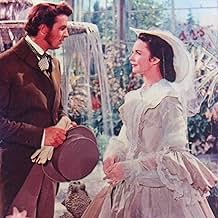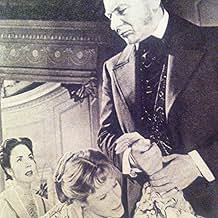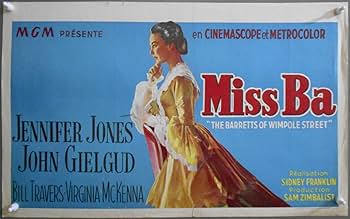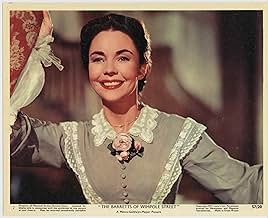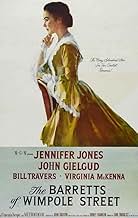Elizabeth Barrett's tyrannical father has forbidden any of his family to marry. Nevertheless, Elizabeth falls in love with the poet Robert Browning.Elizabeth Barrett's tyrannical father has forbidden any of his family to marry. Nevertheless, Elizabeth falls in love with the poet Robert Browning.Elizabeth Barrett's tyrannical father has forbidden any of his family to marry. Nevertheless, Elizabeth falls in love with the poet Robert Browning.
Christopher Cooke
- Minor Role
- (uncredited)
- Director
- Writers
- All cast & crew
- Production, box office & more at IMDbPro
Featured reviews
Being owned by two English cocker spaniels my comments are a bit biased.
This film is intriguing, not just for the overall story but the way Flush, Elizabeth's cocker, was so much integral part of it. Given the 120 line poem that she wrote about Flush it was pleasing to see that Flush was very much a part of the movie.
Sir John Gielgud was a superb actor cast in the role of Elizabeth's tyrannical father. Jennifer Jones performance above par. And of course there was Flush. One very lucky cocker spaniel.
This film is intriguing, not just for the overall story but the way Flush, Elizabeth's cocker, was so much integral part of it. Given the 120 line poem that she wrote about Flush it was pleasing to see that Flush was very much a part of the movie.
Sir John Gielgud was a superb actor cast in the role of Elizabeth's tyrannical father. Jennifer Jones performance above par. And of course there was Flush. One very lucky cocker spaniel.
Although not as engaging as the original play, This film adaptation of BARRETTS OF WIMPOLE ST is a very well made film. John Gielgud gives one of his finest screen performances as Edward Barrett, he is despicable yet worthy of pity. Jennifer Jones is strong as Elizabeth and her character unfolds beautifully before your eyes. The actors who play the clan of brothers nicely delineate each role so they are individuals and not a unit. this film does suffer a bit from the over emphasis on the elizabeth/browning relationship as opposed to the father/daughter one but I suppose this was the hollywood trend toward romance at the time.
I've never seen the 1934 version, so I have nothing to compare with, but John Gielgud was sufficiently overbearing, cold, and creepy in the 1957 The Barretts of Wimpole Street for me to not even want to rent the original. There's an undercurrent of incest when he exerts control over his daughter, so it was probably a risk for him to take the role.
It was not a risk, however, for Jennifer Jones to take on Elizabeth Barrett. She's the queen of melodrama (the predecessor of Susan Hayward) and often has characters who get sick or die in her films. In this one, Jonesie is an invalid and meekly submits to all her father's wishes - until one day she meets the energetic, magnetic Robert Browning (played by Bill Travers). They write each other beautiful letters and fall in love, but she fears they can never overtake her father. It's a classic melodrama and shows off her great training as a heavy dramatic actress.
Young Virginia McKenna nearly steals the show as Jonesie's younger, fiery sister who occasionally has the guts to stand up to their father. They're both clad in beautiful period gowns, and Virginia has a fresh-faced sweetness mixed spunk that reminded me of Katharine Hepburn in Alice Adams. Plus it's really cute to see her act with her husband when they're not paired up as love interests. There aren't any Born Free sparks between them; it's called acting, and Virginia lets Bill romance her onscreen sister.
It was not a risk, however, for Jennifer Jones to take on Elizabeth Barrett. She's the queen of melodrama (the predecessor of Susan Hayward) and often has characters who get sick or die in her films. In this one, Jonesie is an invalid and meekly submits to all her father's wishes - until one day she meets the energetic, magnetic Robert Browning (played by Bill Travers). They write each other beautiful letters and fall in love, but she fears they can never overtake her father. It's a classic melodrama and shows off her great training as a heavy dramatic actress.
Young Virginia McKenna nearly steals the show as Jonesie's younger, fiery sister who occasionally has the guts to stand up to their father. They're both clad in beautiful period gowns, and Virginia has a fresh-faced sweetness mixed spunk that reminded me of Katharine Hepburn in Alice Adams. Plus it's really cute to see her act with her husband when they're not paired up as love interests. There aren't any Born Free sparks between them; it's called acting, and Virginia lets Bill romance her onscreen sister.
Twenty years earlier the same director made the same film in black and white, and this is supposed to be an improvement. It is in technicolour, and it is hard to believe any version could be better. They should actually be quite equal, as both versions use the same script and the same music - only the actors are different. It is also hard to believe that any actress could be better than Jennifer Jones, a specialist in sensitive roles approaching a breaking point, and it is also hard to believe that Fredric March was more perfect in the role than Bill Travers, who couldn't have been more convincing. On the other hand, John Gielgud and Charles Laughton should really have been equals in the formidable role of Edward Barrett, a Dickensian tyrant of the highest degree, who must be the more pitied for his fatal lack of understanding and psychology, refusing to realise that by exerting total strict control of his children they must be stifled, as Elizabeth expressly says, "I am a dying woman", only because of her overbearing father, while Browning actually restores her to life and makes her live for the first time in her life. The actors are all outstanding, but the greatest credit is with the play, which was rightfully a tremendous success from the start, and both films just have to make the play triumph.
The Barretts are a wealthy London family headed by the commanding patriarch Edward Moulton-Barrett (John Gielgud). He has nine children and he demands to be their only object of affection. Elizabeth (Jennifer Jones) is a poet and often unable to walk. She is left stuck on her couch until fellow poet Robert Browning (Bill Travers) enters her life. Of course, father works against the relationship.
It is a costume drama from the 50's. It moves a little slow. I would consider modifying Elizabeth. A couple of things occur to me about her condition. Somebody has to help her dress and undress every day. Somebody has to take her to the bathroom. It doesn't have to be crude, but even alluding to all that would show how she is trapped inside her room and in herself. That does bring up her walking. Jennifer Jones is unable to project the needed frailty in her struggle to walk. She is using too much strength. Maybe she is projecting like she's in a play. On the other hand, John Gielgud has no trouble projecting any range he wants. He is doing a master class of acting. All in all, I like most of this.
It is a costume drama from the 50's. It moves a little slow. I would consider modifying Elizabeth. A couple of things occur to me about her condition. Somebody has to help her dress and undress every day. Somebody has to take her to the bathroom. It doesn't have to be crude, but even alluding to all that would show how she is trapped inside her room and in herself. That does bring up her walking. Jennifer Jones is unable to project the needed frailty in her struggle to walk. She is using too much strength. Maybe she is projecting like she's in a play. On the other hand, John Gielgud has no trouble projecting any range he wants. He is doing a master class of acting. All in all, I like most of this.
Did you know
- TriviaBill Travers and Virginia McKenna got married in September 1957, after the January 1957 release of this film. Travers plays the role of poet Robert Browning, Elizabeth's love interest, and McKenna plays Henrietta, Elizabeth's younger sister.
- GoofsThe London pillar boxes weren't painted red (as seen) until 1874; before that, they were green.
- ConnectionsReferenced in Wogan: Episode #10.35 (1990)
- SoundtracksWilt Thou Have My Hand
Music by Herbert Stothart
[Elizabeth and all her siblings sing the song in her bedroom as she plays the piano; theme heard in the score throughout the movie]
Details
- Release date
- Countries of origin
- Language
- Also known as
- Lo que las paredes ocultan
- Filming locations
- Marylebone Church, Marylebone, London, England, UK(wedding sequence)
- Production company
- See more company credits at IMDbPro
- Runtime
- 1h 45m(105 min)
- Aspect ratio
- 2.55 : 1
Contribute to this page
Suggest an edit or add missing content




